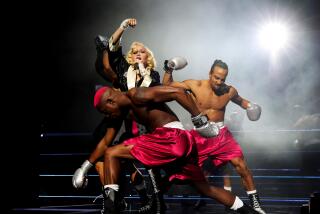Review: What happened when Sophie brought her depersonalized pop to the stage
Can we love a pop star we know virtually nothing about?
Thatâs the question posed by Sophie, the willfully mysterious British musician who performed Monday night at the Teragram Ballroom to close out the month-long Red Bull Music Academy festival.
A gadget-obsessed producer and songwriter, Sophie makes vivid electronic pop tunes roughly in keeping with the glossy sound â and the outsize emotion â of Top 40 cuts by acts such as Taylor Swift and Selena Gomez.
Unlike those celebrities, though, Sophie doesnât offer her music as part of a multimedia personal narrative; indeed, sheâs kept biographical detail so scant that journalists were referring to her until recently as a man.
That means Sophieâs songs â those sheâs made on her own and in connection with the London-based collective PC Music â canât rely on the promise of gossip or confession; they donât deepen our understanding of a semi-realistic character we think we know from interviews and social media.
What the music gets over on instead is pure sensation: the crackle and thump of the beat in her song âHard,â the carefully pitch-shifted vocal in âBipp,â the wistful melody in âJust Like We Never Said Goodbye.â
Sophie, who now lives in Los Angeles, also toys with ideas of gender and consumerism. In 2015 she licensed her underground hit âLemonadeâ to McDonaldâs for use in a commercial â then titled her debut album âProductâ to let us know she was in on the joke.
In spite of that attitude (or perhaps because of it), Sophie has gotten close to the pop mainstream she so cleverly critiques; sheâs produced songs for Madonna and Charli XCX, and in January she turned up in a photo with Rihanna on the singerâs Instagram.
Sophieâs latest single, which came out in mid-October, reflects some of what sheâs learned working with those masters of self-branding. âItâs Okay to Cryâ is a moving power ballad built around the kind of vulnerable vocal performance weâve been trained to regard as a peek behind a superstarâs curtain.
Yet the genius of the song is that it doesnât actually reveal anything; itâs a triumph of aesthetics, not circumstance, which in todayâs pop scene feels like a radical act.
You could recognize Sophieâs attempt to pull off something similar at the Teragram. Dressed in a series of strong looks â one a high-ponytail situation that called to mind Madonna on her âBlond Ambitionâ tour â the artist performed mostly new material that few in attendance had likely heard. Between songs Sophie declined to explain what she was singing about or even to talk to the audience in a meaningful way.
As on âProduct,â though, the music â largely prerecorded with what looked like some live manipulation by Sophie â spoke for itself just fine; the songs were as sweet as they were brutal, with funny but vicious words about shopping, sex and science.
Yet as a live experience Mondayâs show failed to meet Sophieâs exacting standards.
In the studio her creativity and her perfectionism provide all the thrills a pop fan might need. Here the performance (which included a small crew of backing singers and dancers) felt unformed and amateurish; the choreography was clumsy, while Sophieâs weak delivery diminished the songsâ provocations.
It made you long to be in the hands of someone more at ease with giving herself over to a crowd.
One exception was the concertâs closer, for which Sophie sang (or dramatically lip-synced) âItâs Okay to Cryâ in front of a giant screen that reproduced the garish nature scenes from the songâs striking music video.
Then again, what made that number memorable was the earnest determination she was putting into getting her big song right â a poignant human display that felt in its own way like a betrayal of Sophieâs unique artistic project.
Twitter: @mikaelwood
ALSO
Jay-Z goes to war with himself on tour behind â4:44â
Showtimeâs flimsy âGeorge Michael: Freedomâ isnât worthy of its subject
All that hate for Arcade Fireâs new album? Win Butler finds it âtremendously excitingâ
More to Read
The biggest entertainment stories
Get our big stories about Hollywood, film, television, music, arts, culture and more right in your inbox as soon as they publish.
You may occasionally receive promotional content from the Los Angeles Times.









